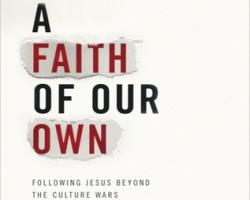Jonathan Merritt
FaithWords, 2012,224 pp., $19.99
In A Faith of Our Own, Jonathan Merritt paints a reflective and insightful picture of how rising Christians pass on joining political bandwagons in an effort to reclaim authentic, incarnational faith. He speaks personally, as wlel as on behalf of a generation that desires to move from advocating faith to sincerely and publicly living out the teachings of Scripture in a world that desperately needs to see Jesus for who He really is. This is essential reading for pastors and youth workers seeking to come alongside and encourage young people to follow Christ.
—Andrew Hedges
In A Faith of Our Own, Jonathan Merritt presents a theology for those Christians who find themselves fed up with political grandstanding and being forced to choose a particular political party based on directives from those in authority of their church, denomination or supposed theological bent. Merritt offers readers a sound look at cultural issues and the fact that Christians should not claim any creed other than the creed of Scripture. In this regard, he points out where conservative and liberal Christians have taken missteps in their support of a particular political party, candidate or issue. He explores abortion, racism, the Christian approach to homosexuality, environmental issues, caring for orphans and how we should face poverty head on. All thinking Christians should consider the words presented in this book! We should seek to discover the unity Christ prayed for and let go of the politicking that currently divides the body of Christ. Let us become witnesses for His love in the world! Youth ministers can use this text in order to inform themselves of trends in our society and as a resource in considering how we approach these hot-button issues within ministry. We need to let go of much that we cling to in order to truly share the gospel of love with others.
—Joel Jackson
I have been out of the country a few times, and I’m always concerned about the language barrier. I would wonder whether I would make sense or if I would say something dumb or offensive. It’s funny that when I am out of the country, I am always trying to find someone who is like me or at least speaks my language well. It brings me comfort. This is why I was so glad to find a conservative who spoke my language—not an extreme language that made me uncomfortable but a comforting and hopeful language that we could all rally around.
Talking politics is much like visiting a strange country, and Jonathan offers an excellent travel guide to the world of politico. Jonathan’s perspective of the future is formed partly by what he saw and experienced in the past as a student of Liberty University. His personal experience with Jerry Falwell offers us a context of the birth place of the far right and the extreme right, but the book does not let us rest in the past; it pushes us forward beyond titles, parties and organizations. A Faith of Our Own challenges Christians of any political persuasion to be the leaders in civility and discourse. Jonathan teaches us all how to lower our voice, open our ears and extend our hands to those with whom we disagree to accomplish something we do agree on—a faith in Christ that changes hearts and minds.
—Paul Turner
As the election approaches, I continue to wrestle with what it means to follow Jesus politically. Walk into an evangelical church, and many people will suggest this means voting Republican. Walk into a mainline church, and you’ll hear the opposite: Vote Democrat. However, does voting Republican or Democrat really mean to be a person of faith when it comes to politics?
This is one of the questions author Jonathan Merritt addresses in his new book, A Faith of Our Own: Following Jesus Beyond the Culture Wars. He does so by advocating that before Christians “embark on political engagement,” they investigate what it means to pursue God’s kingdom. In doing so, they can move the conversation beyond partisan politics to the question: “How should Christians engage politics?”
Using stories of his own experience as the son of an influential Southern Baptist pastor, his college days at Jerry Falwell’s Liberty University, and his experiences abroad, Jonathan seeks to answer this question by investigating church history and Scripture while simultaneously imploring people to return to Jesus. According to Jonathan, Jesus’ call to Christians is not to “productive citizenship, but an invitation to leave everything and follow a new king.” Such a call compels younger Christians to disengage from the partisan politics of their fathers and make their faith their own by passionately addressing issues, including abortion, poverty, war and creation care in whatever ways their faith calls them.
The result is an easy, thought-provoking read ideal for anyone wrestling with how faith intersects with politics. As a book that leans neither right nor left politically, it is also one likely to spark discussion among people of varying political persuasions, making it a good bet for small group discussions.
—Jen Bradbury
###




